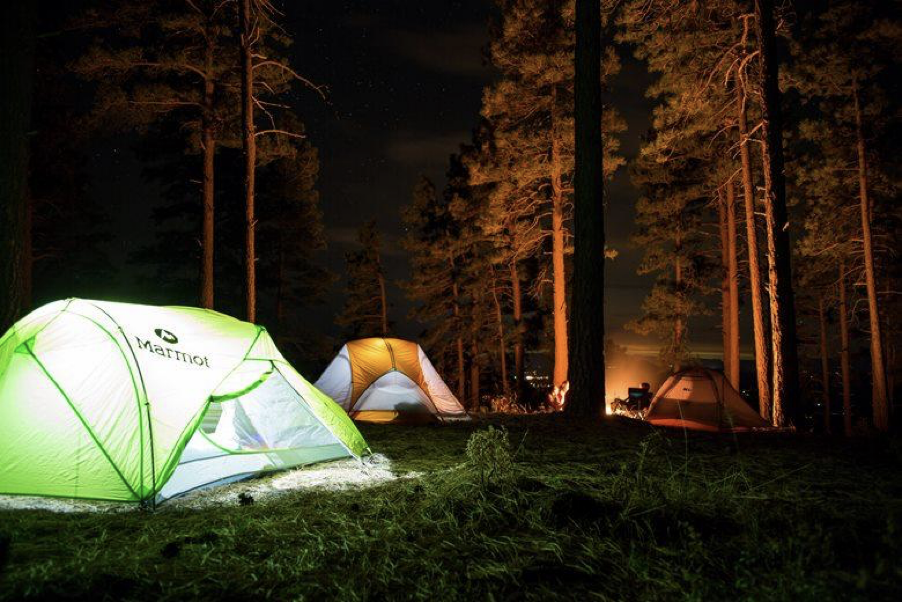Summertime means outdoor fun, and what better way to enjoy nature than with a camping trip? Unfortunately, camping has its challenges; in fact, most campers fall prey to insect bites and windborne irritants that can worsen your trip. And since going to the hospital is not an option in most cases, you need to come prepared. This means carrying some essential herbs to ease aches, dealing with rashes, and even deter unwanted pests.
So whether you’re roughing it in the wilderness or just taking advantage of your state park’s campground, you need to pack some essential herbs for dealing with these problems. Herbs are affordable, easy to prepare and will not take too much space in your camping bag. Plus, you can plant some of these herbs and make them part of your landscape.

Photo by Tommy Lisbin on Unsplash
9 Herbal Essentials for a Summer Camping Trip
Since you’re a nature lover, then you know that animal’s life matters, especially reptiles; therefore, make sure you don’t pack anything that can be poisonous to them, and this includes your herbs. If you need more resources to properly care for reptiles, visit Reptiles Life. After all, some beneficial herbs can be toxic to some reptiles. Plus, knowing how to differentiate different types of reptiles like snakes can save your life if bitten. Some of the essential herbs for your summer camping trip include:
1. Chamomile
Chamomile tea is a famous beverage with lots of health benefits that belongs to the Asteraceae plant family. It has been used as a natural remedy for centuries. Plus, it’s easy to prepare, all you have to do is dry and then infuse them into hot water, and you’re good to go. Most folks love chamomile tea because it’s a caffeine-free alternative for green and black tea. Plus, its earthy taste is somewhat sweet.
Chamomile is one of the best calming and soothing herbs; therefore, it can help you to sleep while soothing your stomach. It has some anti-fungal and antibacterial properties that can come in handy when you get rashes, bruises and cuts.
2. Echinacea
Echinacea is a popular herb that has been promoted as a dietary supplement for dealing with numerous infections, including the common cold. After all, it’s known for stimulating your immune system, which in turn can help your body fight off innumerable infections. It can come in handy if you get flu or a cold while camping. Echinacea is also effective against viruses; it doesn’t have any side effects.
3. Peppermint
Peppermint is a natural hybrid of wild mint and spearmint that belongs to the mint family. Thanks to their medicinal values, peppermint oil and leaves can be pretty beneficial. Peppermint oil can reduce digestive tract spasms, and when applied to the skin, it can help relieve pain and itching. Most folks prefer starting their day with a cup of peppermint tea.
4. Nettle
Nettle is a wild herb that is found in abundance all over the world. Though it has been used for centuries as a food and medicine, nettle is only now gaining popularity as a superfood. Nettle is high in protein, minerals, vitamins and antioxidants, making it an incredibly nourishing plant.
Nettle is also a natural diuretic, meaning it helps the body to flush out toxins and excess fluid. This can be beneficial for conditions such as high blood pressure and congestive heart failure. Nettle is also known to boost the immune system, which helps the body fight off infections.

Photo by Tegan Mierle on Unsplash
5. Lavender
Lavender has been used for centuries for its therapeutic properties. It is a natural relaxant and can be helpful in relieving stress, anxiety, and insomnia. Lavender is also an anti-inflammatory antiseptic and can be used to treat skin irritations and wounds. In addition, lavender is said to have antidepressant effects; therefore, you can use it to stabilize your moods. Lavender is the best herb that can help you relax after a very long day hunting, hiking, or fishing.
6. Turmeric
Turmeric is a fantastic spice that is commonly used in Indian cuisine. This spice has several health benefits, and it can help reduce inflammation after you have spent the entire day hiking. It also has a warming sensation that can help with pains and aches, which makes it ideal for chronic pain relief. The antimicrobial properties of turmeric can help kill harmful bacteria and viruses.
7. Passionflower
Passionflower is a unique climbing vine that has been used to heal a wide range of infections for centuries. But just because it has numerous health benefits, it doesn’t mean that you should not take care of it.
Passionflower can be used for nerve pain, vomiting, and diarrhea. But when camping, most folks use passionflower as a sleep aid and reduce anxiety. So you can use it as tea, capsule or tincture.
8. Dandelion
The dandelion is a weed that many people try to get rid of in their yards. However, this weed has many health benefits that people may not know about. The dandelion is a good source of vitamins A, C, and K and minerals such as iron, potassium, and zinc.
This herb can help lower your cholesterol levels, manage high blood pressure and detoxify your liver. Plus, dandelion tea or coffee can help you deal with numerous digestive issues like upset stomach, gas, or bloating.
9. Ginger Tea
Ginger tea is a popular beverage choice for its many health benefits. Made from fresh ginger root, water, and honey (or sugar), ginger tea can be enjoyed hot or cold. Most campers use ginger to fight off colds and flu. Ginger tea is a natural stomach soother that can help you deal with stomach upset. Plus, the fact that it can boost your immune system is a bonus. So, when it gets cold, you can drink this soothing tea and enjoy its many health benefits.
Conclusion
With some preparation, you can make your camping trip more enjoyable by packing some herbal essentials. By bringing along these natural remedies, you’ll be able to enjoy the great outdoors without having to worry about pesky pests or uncomfortable symptoms. The above herbals can improve your health and keep you safe the entire trip. Plus the fact that they are affordable and you can plant some of them in your garden is a bonus.
